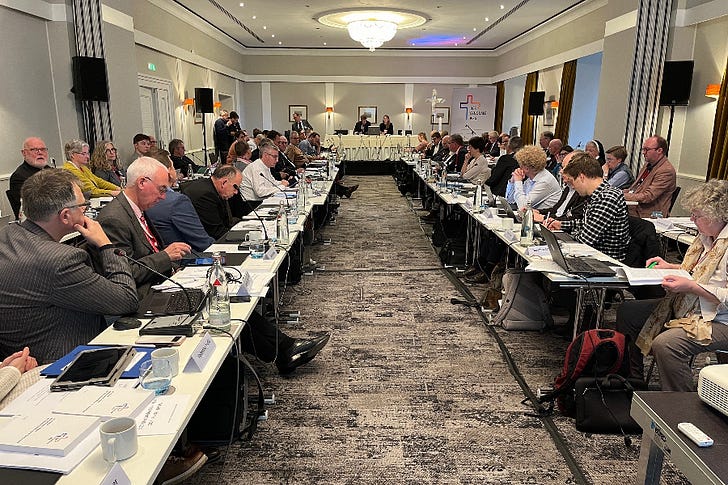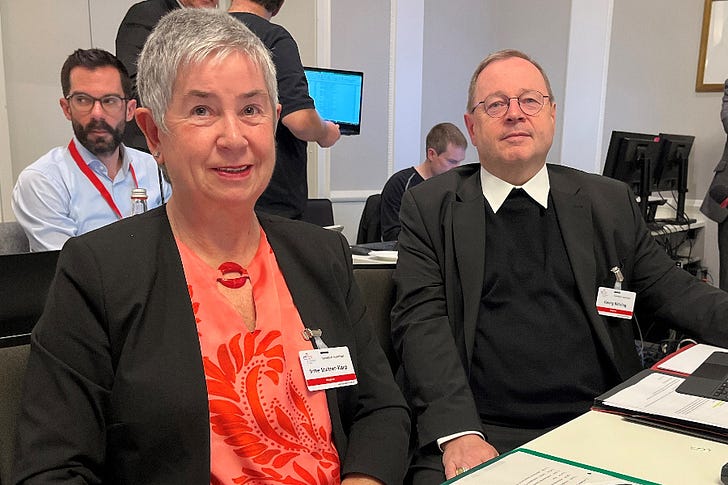
8 bishops absent as Germany’s synodal committee meets
The committee will seek to implement the synodal way's resolutions.
Eight out of Germany’s 27 diocesan bishops missed Friday’s inaugural meeting of a committee designed to implement the decisions of the country’s “synodal way.”

Four of the bishops are boycotting the body known as the synodal committee, while four others were absent due to other commitments.
German bishops’ conference chairman Bishop Georg Bätzing announced Nov. 10 that Cologne’s Cardinal Rainer Maria Woelki, Eichstätt’s Bishop Gregor Maria Hanke, Passau’s Bishop Stefan Oster, and Regenburg’s Bishop Rudolf Voderholzer had refused an invitation to take part in the committee.
The quartet had signaled their intention in June when they vetoed plans for the committee to be paid for using a fund controlled by Germany’s diocesan bishops.
The synodal way formally ended in March, but the synodal committee is intended to pave the way for a permanent “synodal council” of bishops and lay people in 2026.
The committee was supposed to consist of all 27 diocesan bishops, as well as 27 representatives of the lay Central Committee of German Catholics (ZdK) and 20 members elected by synodal way participants. Following the four bishops’ boycott, it will have 70 members.
Rome objected to plans for the synodal council in January, arguing that it would undermine the role of bishops as expressed in the teachings of the Second Vatican Council.
Responding to a letter from five German bishops — the four who are boycotting the synodal committee, plus Augsburg’s Bishop Bertram Meier — the Vatican said that no bishop was obliged to take part in the committee’s deliberations.
The other four bishops who did not attend the Nov. 10-11 meeting in Erfurt were Freiburg’s Archbishop Stephan Burger, Hamburg’s Archbishop Stefan Heße, Bishop Meier, and Hildesheim’s Bishop Heiner Wilmer.
Burger, Heße, and Meier had previously scheduled events in their dioceses, while Wilmer was visiting Israel.
Addressing delegates at the start of the two-day meeting, Bishop Bätzing said: “We have known for a long time that even among us bishops our images of the Church and the future are very different. I want to expressly say that this is good.”
“We have to fight for the future of the Church and the question of the right path has accompanied the Church since its beginnings; the letters from the New Testament are full of these disputes. I regret that important impulses are not discussed here with the refusals; that makes us poorer here.”
“But all the efforts at persuasion and the bridges that were sought to be built were not successful. This is particularly painful because not only are four people missing, but four bishops who could also bring in the experiences of their respective dioceses here and, conversely, also communicate the consultations to their dioceses.”

The inaugural meeting is expected to feature sensitive discussions about the body’s statutes and rules of procedure.
Debate is likely to focus on whether synodal committee meetings should follow the model of the synodal way’s plenary assemblies, which were open to the public. There will also be discussion of whether the committee should break with the synodal way’s rule that all resolutions must be approved by two-thirds of bishops.
The ZdK is in favor of public meetings and for decisions to require only a two-thirds majority of all committee members.
Speaking Nov. 10, ZdK leader Irme Stetter-Karp alluded to the record numbers of German Catholics formally leaving the Church.
“The euphoria of the beginning has passed and we realize how difficult it is to establish the necessary structural and habitual changes in our Church,” she said.
“We at the ZdK made it clear from the start that we had to be measured by the results. Given the challenges we have also faced in recent months, I can only note with regret that in the eyes of those who are leaving the Church we are moving too slowly.”
Referring to Pope Francis’ Nov 1 motu proprio calling for a “paradigm shift” in theology, she went on: “We need the turning point that Pope Francis calls for in his motu proprio Ad theologiam promovendam for Catholic theology as a ‘courageous cultural revolution,’ starting from theology for the entire Church.”
“It is time, in the pope’s words, to ‘interpret the present prophetically and seek new paths for the future.’ That’s what we’re here for.”
Stetter-Karp lamented the four bishops’ decision to block funds for the synodal committee.
“This shows how urgently we need changes in the decision-making structures,” she commented.
Committee organizers have not announced whether they have found alternative funding for the body. But the German newspaper Die Tagespost reported Nov. 10 that four dioceses — Munich and Freising, Limburg, Münster, and Würzburg — have agreed to establish a foundation to underwrite the initiative.
Stetter-Karp noted that the inaugural synodal committee meeting had been “deliberately scheduled” to take place after the synod on synodality’s first session at the Vatican.
“The deliberations in Rome made it abundantly clear that concrete, visible changes are needed in the Church,” she said.
“The synod voted on the Letter to the People of God with 336 ‘yes’ votes and only 10 ‘no’ votes. The synthesis also achieved a high level of approval. It identifies central points of the urgently needed cultural change.”
“The synod condemned sexual violence and the mass abuse of people and at the same time highlighted it as a structural problem in the Church. It has spoken out against discrimination against believers based on their sexual orientation. It voted to strengthen women’s rights in the Church. It wants more participation of all baptized people, more transparency, and an end to abuse of power. I hope that we will see this in concrete terms, in the local Church, all over the world.”
Bishop Bätzing, who attended the Rome assembly, said: “There must be and can be different ways of structuring synodality at different levels and in different regions of the world.”
“Different traditions and cultural differences lead to different forms of synodality. We can also learn from each other. And yet we must live and continue to search for a form of synodality that is suitable for us.”
He continued: “With regard to concretization, work lies ahead for the universal Church and the individual particular churches. But the experience of the synod, as well as a look at the synod’s synthesis, shows that not only the problems were identified, but also the spaces were opened up to look for a new way of dealing with these questions and problems.”
“In this respect, one can actually state that the synod on synodality creates a tailwind that should also be felt on our synodal path and that helps us move towards a new, more synodal shape of the Church.”
“We want to contribute our experiences to the synodal discussion of the global Church again by next fall and then, last but not least, to the 2024 synod in Rome.”








“Different traditions and cultural differences lead to different forms of synodality. We can also learn from each other. And yet we must live and continue to search for a form of synodality that is suitable for us.”
Learn from everyone, but teach no one. Invite different perspectives to the table, but some voices are more different than others. Listen, except for when you're told that unchangeable teaching means precisely that.
"It has spoken out against discrimination against believers based on their sexual orientation. It voted to strengthen women’s rights in the Church."
It is no coincidence that these are the same issues which kickstarted our current culture wars. This is cultural Marxism trying to take its first inch of footing within the Church; a wolf dressed in virtuous clothing.
Let's not forget that the Church already celebrates women, venerates Mary. And same-sex attraction is not a sin, these people are welcome and loved just as we all are, but we should not change the faith to suit the incompatible hedonistic whims of the modern world.